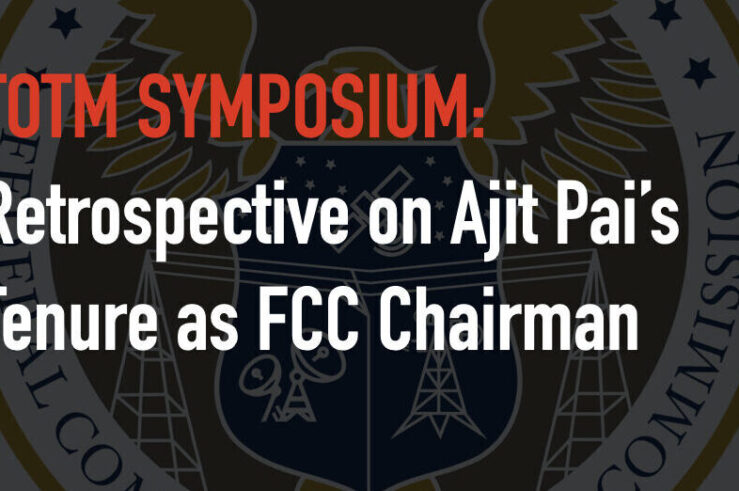Showing results for: “premium natural and organic”
Section 5 of the FTC Act and monopolization cases: A brief primer
In the past two weeks, Members of Congress from both parties have penned scathing letters to the FTC warning of the consequences (both to consumers and the agency itself) if the Commission sues Google not under traditional antitrust law, but instead by alleging unfair competition under Section 5 of the FTC Act. The FTC is rumored to be ... Section 5 of the FTC Act and monopolization cases: A brief primer
Why FTC Competition Rulemaking Likely Will Fail
I. Introduction In over a century of existence, the U.S. Federal Trade Commission (FTC) has been a policy leader in developing American thinking about and in enforcing antitrust and consumer protection laws pursuant to several specific statutory mandates. It has also promulgated a substantial number of consumer protection rules, dealing with a wide variety of practices. ... Why FTC Competition Rulemaking Likely Will Fail
The Virtues and Pitfalls of Economic Models
Interrogations concerning the role that economic theory should play in policy decisions are nothing new. Milton Friedman famously drew a distinction between “positive” and “normative” economics, notably arguing that theoretical models were valuable, despite their unrealistic assumptions. Kenneth Arrow and Gerard Debreu’s highly theoretical work on General Equilibrium Theory is widely acknowledged as one of ... The Virtues and Pitfalls of Economic Models
Against the Jones Act
Economist Josh Hendrickson asserts that the Jones Act is properly understood as a Coasean bargain. In this view, the law serves as a subsidy to the U.S. maritime industry through its restriction of waterborne domestic commerce to vessels that are constructed in U.S. shipyards, U.S.-flagged, and U.S.-crewed. Such protectionism, it is argued, provides the government ... Against the Jones Act
"Yale on $0 a Day" Sparks a Wonder Moment
We’re so immersed in the benefits of a market economy that I fear we sometimes fail to notice what a marvel capitalism is. Today’s Wall Street Journal points to yet another of capitalism’s benefits. A growing number of very, very fancy colleges with very, very talented professors and very, very expensive tuition are offering their ... "Yale on $0 a Day" Sparks a Wonder Moment
A Few Thoughts on Law School Specialization
The topic of specialization in law school faculties has come up again in the blogosphere, as tends to be the case around hiring season. Mark Fenster starts us off at Prawfs with a very thoughtful post noting some of the potential costs associated with specialization and concludes: To me, the ideal law school would be ... A Few Thoughts on Law School Specialization
Great Job, Kid! (And Welcome to the Private Sector)
Many thanks to Geoffrey Manne for this opportunity to memorialize a few thoughts I have about Ajit’s service on the Federal Communications Commission. My remarks will be more about Ajit as a person rather than the substance and long laundry list of his accomplishments as chair. Others will do that, I’m sure. The first memory ... Great Job, Kid! (And Welcome to the Private Sector)
Meese and Oman Spank the Corporate Law Prof Amici in Hobby Lobby
The Religious Freedom Restoration Act (RFRA) subjects government-imposed burdens on religious exercise to strict scrutiny. In particular, the Act provides that “[g]overnment shall not substantially burden a person’s exercise of religion even if the burden results from a rule of general applicability” unless the government can establish that doing so is the least restrictive means of furthering ... Meese and Oman Spank the Corporate Law Prof Amici in Hobby Lobby
What is a search engine?
What is a search engine? This might seem like an innocuous question, but it lies at the heart of the US Department of Justice and state Attorneys’ General antitrust complaint against Google, as well as the European Commission’s Google Search and Android decisions. It is also central to a report published by the UK’s Competition ... What is a search engine?
Antitrust, Obsolescence and the "New Economy" (Again)
Gordon Crovitz (WSJ) plays the new economy card on antitrust. Its a familiar wrap for those in the antitrust community that hit its peak in the original Microsoft days with virtually every competition policy scholar and commentator chiming in with an opinion about whether the internet and network effects and so forth rendered antitrust obsolete. ... Antitrust, Obsolescence and the "New Economy" (Again)
Calling into Question the FTC’s Theory of the Case in FTC v. Qualcomm
This post does not attempt to answer the question of what the court should decide in FTC v. Qualcomm because we do not have access to the information that would allow us to make such a determination. Rather, we focus on economic issues confronting the court by drawing heavily from our writings in this area: ... Calling into Question the FTC’s Theory of the Case in FTC v. Qualcomm
Why the Canadian Supreme Court’s Equustek decision is a good thing for freedom — even on the Internet
I recently published a piece in the Hill welcoming the Canadian Supreme Court’s decision in Google v. Equustek. In this post I expand (at length) upon my assessment of the case. In its decision, the Court upheld injunctive relief against Google, directing the company to avoid indexing websites offering the infringing goods in question, regardless ... Why the Canadian Supreme Court’s Equustek decision is a good thing for freedom — even on the Internet








